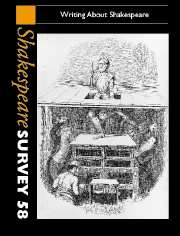Book contents
- Frontmatter
- Having Our Will: Imagination in Recent Shakespeare Biographies
- Toward a New Biography of Shakespeare
- Jonson, Shakespeare and the Exorcists
- ‘Lending soft audience to my sweet design’: Shifting Roles and Shifting Readings of Shakespeare’s ‘A Lover’s Complaint’
- ‘Armed at point exactly’: The Ghost in Hamlet
- Writing About Motive: Isabella, the Duke and Moral Authority
- Writing Performance: How to Elegize Elizabethan Actors
- Elizabeth Montagu: ‘Shakespear’s poor little Critick’?
- Rewriting Lear’s Untender Daughter: Fanny Price as a Regency Cordelia in Jane Austen’s Mansfield Park
- The Prequel as Palinode: Mary Cowden Clarke’s Girlhood of Shakespeare’s Heroines
- Shakespeare Among the Workers
- Virginia Woolf Reads Shakespeare: Or, her Silence on Master William
- Shakespeare and the Invention of the Epic Theatre: Working with Brecht
- Dramatizing the Dramatist
- Shakespeare in Drama Since 1990: Vanishing Act
- Writing about [Shakespearian] performance
- Shakespeare and the Prospect of Presentism
- Writing Shakespeare in the Global Economy
- The ‘Complexion’ of Twelfth Night
- Translation as Appropriation: Vassilis Rotas, Shakespeare and Modern Greek
- How Old Were Shakespeare’s Boy Actors?
- Mistress Tale Porter and the Triumph of Time: Slander and Old Wives’ Tales in The Winter’s Tale
- Shakespeare Performances in Ireland, 2002–2004
- Shakespeare Performances in England, 2004
- Professional Shakespeare Productions in the British Isles January–December 2003
- The Year's Contributions to Shakespearian Study 1 Critical Studies
- 2 Shakespeare in Performance
- 3 Editions and Textual Studies
- Books Received
- Index
Shakespeare Performances in Ireland, 2002–2004
Published online by Cambridge University Press: 28 March 2007
- Frontmatter
- Having Our Will: Imagination in Recent Shakespeare Biographies
- Toward a New Biography of Shakespeare
- Jonson, Shakespeare and the Exorcists
- ‘Lending soft audience to my sweet design’: Shifting Roles and Shifting Readings of Shakespeare’s ‘A Lover’s Complaint’
- ‘Armed at point exactly’: The Ghost in Hamlet
- Writing About Motive: Isabella, the Duke and Moral Authority
- Writing Performance: How to Elegize Elizabethan Actors
- Elizabeth Montagu: ‘Shakespear’s poor little Critick’?
- Rewriting Lear’s Untender Daughter: Fanny Price as a Regency Cordelia in Jane Austen’s Mansfield Park
- The Prequel as Palinode: Mary Cowden Clarke’s Girlhood of Shakespeare’s Heroines
- Shakespeare Among the Workers
- Virginia Woolf Reads Shakespeare: Or, her Silence on Master William
- Shakespeare and the Invention of the Epic Theatre: Working with Brecht
- Dramatizing the Dramatist
- Shakespeare in Drama Since 1990: Vanishing Act
- Writing about [Shakespearian] performance
- Shakespeare and the Prospect of Presentism
- Writing Shakespeare in the Global Economy
- The ‘Complexion’ of Twelfth Night
- Translation as Appropriation: Vassilis Rotas, Shakespeare and Modern Greek
- How Old Were Shakespeare’s Boy Actors?
- Mistress Tale Porter and the Triumph of Time: Slander and Old Wives’ Tales in The Winter’s Tale
- Shakespeare Performances in Ireland, 2002–2004
- Shakespeare Performances in England, 2004
- Professional Shakespeare Productions in the British Isles January–December 2003
- The Year's Contributions to Shakespearian Study 1 Critical Studies
- 2 Shakespeare in Performance
- 3 Editions and Textual Studies
- Books Received
- Index
Summary
In one of the final scenes of Frank McGuinness’s Mutabilitie (1997) located in Ireland, there is a parting speech between William (Shakespeare) and the Irish Bard, the File, before William returns to London intending to make ‘another crooked sixpence in a crooked house among men as crooked as myself’. The File (Gaelic for poet) is disillusioned with Shakespeare; this jobbing playwright is not the poet of her prophecies. Shakespeare has come to Ireland with his players, not to fulfil a romantic, nationalist role, but to act and ‘live like Lords in Ireland’. McGuinness, with the added richness of national contexts, explores, as did Edward Bond in Bingo, a discrepancy between the identity of the writer and the art: ‘I do exist but not as you imagine’, claims William to File. The perplexing question of Shakespeare’s identity – colonial and post-colonial – in Ireland frames Mutabilitie. Equally resonant is the clash of cultures epitomized in the contrast between the pragmatism of Shakespeare and the desperate, pessimistic romanticism of the File. Something of these issues underlies the performance of Shakespeare’s plays in Ireland – and here my discussion is limited to the Republic. On the one hand, its national theatre, the Abbey, which last year celebrated its centenary, performs Shakespeare quite rarely. On the other hand, Shakespeare, while not compulsory, remains central to the school curriculum. There has been a strong tradition of amateur productions of Shakespeare, notably that of the Dublin Shakespeare Society, formerly the British Empire Shakespeare Society. However, the choice of text for large auditorium productions is largely dictated by the limited range of the school syllabus, since it is this that will guarantee an audience. When a professional Irish theatre company decides to do Shakespeare, other than for schools, it is faced with the task of making a creative discovery that is its own and interesting risks are often taken.
- Type
- Chapter
- Information
- Shakespeare Survey , pp. 260 - 267Publisher: Cambridge University PressPrint publication year: 2005

